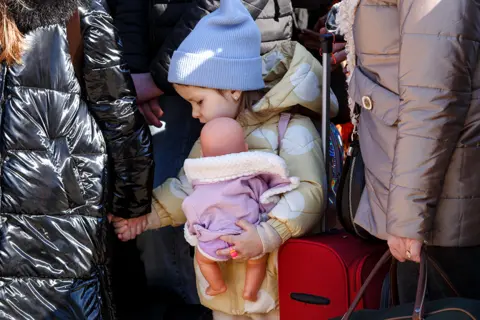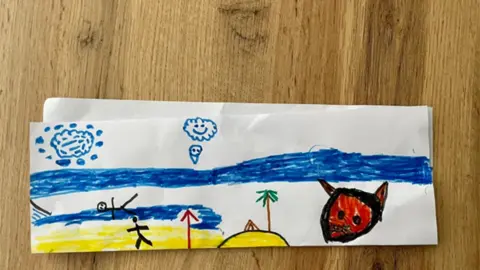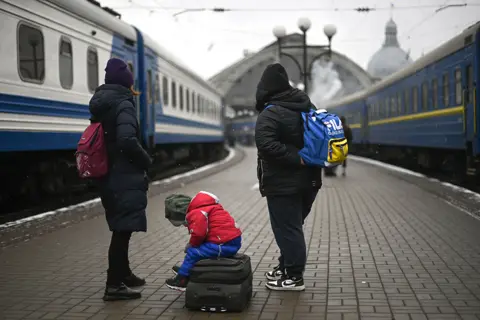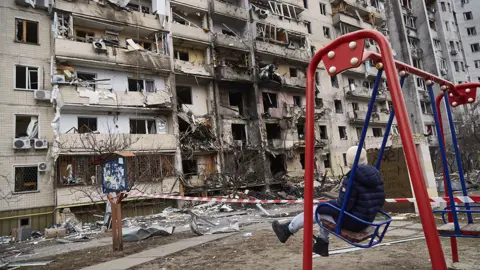Ukraine: 'We try to tell them the truth' - parenting in wartime
 Getty Images
Getty ImagesIn Ukraine, families are having to adapt to a terrifying new reality. How do you tell young children that you're at war?
Ten days ago Anton Eine, a science fiction writer in Ukraine, had been due to launch his latest book - but then the Russians invaded. Now, he says, none of that matters any more. He is hunkering down in Kyiv with his wife and their three-year-old son.
They live in a 24-storey apartment block with an underground car park, where people are sleeping on the concrete floor. It's bitterly cold, and Anton is worried about what might happen if the building collapses, so he and his family feel safer in a square concrete well between the lifts. That has become their sanctuary during the constant air raid sirens. They bring toys and their son's tablet and make sure he sits in the corner, which is the safest place.
Anton says their son is worried, and asks lots of questions. "Yesterday, my wife went downstairs and when she returned, he was asking, 'Mum, did they shoot you?' and she said 'No baby', and he said, 'Will they shoot me? I don't want them to go bang-bang'."
Anton says some parents have sewn badges with their child's blood group on to their clothes and are teaching them their home address and parents' names, in case they are separated. And while they hide in shelters or try to board trains to safety, many parents are also talking to each other about how the war is affecting their children, and how best to protect them from trauma.
"Some parents tell the kids it's a game," says Anton. "We are trying to tell our son the truth, but in a softer way, adapted to the mind of a three-year-old kid.
"We tell him that bad soldiers attacked us and the good soldiers, the ones with the Ukrainian flag, are the ones who protect us, and you don't need to worry here in this sanctuary."
His own son's drawings don't appear to show any signs of trauma, but some of Anton's friends have older children, and the pictures they draw clearly show they've been affected by the situation.

The parents and staff from his son's nursery stay in touch via the social media app Telegram, where they share advice about how to talk to the children about what's going on. This even included a tutorial on how to explain to the kids why it was OK for adults to swear now, while it was not OK in normal life. "Because people are swearing right now," says Anton.
They have become more relaxed about other little things, too. "Because of this situation, he has to watch much more cartoons than normal, and is eating much more sweets than normal. We need something to occupy him - he has to not pay too much attention to what's going on.
"The psychologists advise us to be gentler with kids in these times, and to love them much more than usual," says Anton.
When it comes to safety, though, they have to be quite strict. Their three-year-old quickly learned that when there's a siren, the family have to run and hide. "As soon as we hear sirens or get a notification we shout, 'To the shelter!' and whatever he's doing he leaves it and runs. He understands that the situation is extraordinary. It even surprises us how well children understand the necessity to behave properly."
 Getty Images
Getty ImagesAs the Russian shelling gets worse and the convoys close in, many Ukrainian parents have decided to flee their homes with their young children in tow.
Hanna, a scientist, left Kyiv and travelled to Poland with her two sons, who are eight and six years old. For days, they had been at home listening to explosions, the windows trembling, and she somehow had to tell them what was going on. She found it hard to strike a balance between reality and how much a child's mind can take.
"This was a challenge for me as a mother because I have to choose between how to explain the truth, but at the same time not to scare them too much," she says. "So I was just telling them that we are under attack, and at the moment we are safe, but when we feel we have to move, they have to listen."
Her parenting style had to change, too - there was no room for discussion. "Normally I ask them to do something, but this is a time to get orders."
 Getty Images
Getty ImagesAfter a few days of shelling, Hanna felt she no longer wanted her children to hear the bombs and decided to leave Ukraine. "It was a very, super hard decision," she says.
Her children had to make a hard decision too - they could only take one of their toys. Her eldest chose Toothless, a toy dragon from the How to Train your Dragon series, and her youngest chose a Transformer toy car that turns into a robot. It was a huge decision for them, says Hanna - perhaps as momentous as it was for her to leave her country. "I think that we were in the same emotional decision-taking position."
It took them 52 hours to reach safety in Poland. Hanna's ex-husband came with them for the first part of the car journey but then had to turn back, to fight. Hanna says travelling in a war zone with two kids was exhausting and she can understand why many of her friends are choosing to stay nearer home.
Now they are safe, but the boys ask lots of questions, about their grandparents and especially their father, who has stayed behind. "Heart-breaking questions, because they ask me every day if he is alive, or if he still has his hands and legs. They are afraid that he can get super hurt."

War in Ukraine: More coverage
- LIVE: Latest updates from on the ground
- IN KYIV: Locals fear another Grozny or Aleppo
- ANALYSIS: Europe finally steps up
- EXPLAINED: Why Putin has invaded Ukraine?
- IN DEPTH: Full coverage of the conflict

Hanna tells them to try and live in the present. "All we have is just now. At the moment we are safe," she says.
How much to tell their children is something all parents are having to weigh up. Oksana fled her home town of Lviv, in the west, and is now also in Poland. Her six-year-old daughter is autistic and hates loud noises, so she found the air raid sirens very scary. She could tell her mother was nervous too, so Oksana told her the truth about what was happening.
"I was explaining that it's a war and we need to be safe, and that a lot of people are dead now because of all this," says Oksana. "I think it is important that when children are old enough to understand they are not misled, because they can sense the atmosphere is bad."
Iryna's son is just two, and she has decided not to tell him too much. After spending three nights in a bomb shelter they left Irpin, a small city near Kyiv, and went to western Ukraine.
She told her son they were going to stay with friends, because he's too young to understand that they're in danger. "I didn't tell him that it's a war. I'm not sure I have to when he's so young, because I think it makes this situation only worse."
As for Anton and his family, the Russian troops are closing in and they may have to evacuate soon. He's not sure where to. "No-one knows which place is the safest - so it's gambling," he says.
- Hanna, Oksana and Iryna spoke to Outside Source on the BBC World Service.
